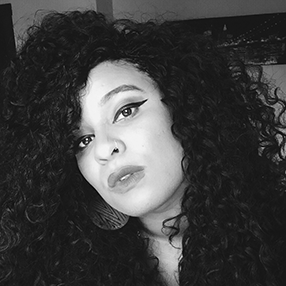Lord—
Your good daughter I have been
my whole life.
I’ve kept your house
clean as sucked bone,
starved myself of everything
your other children have told me is sin.
I’ve sharpened my teeth on the slate
of your Word for your work’s sake.
Bridled the glint of my tongue
so men will feel strong
and not be seen trembling
under the soft of it.
I’ve behaved
and for what
do I hunger, myself growing slight
on tomorrow’s meat:
words, words, your words
as valued here as Black credit
at an all-American bank.
They say, Lord, piety is speaking to you,
but madness is hearing you
speak back. And under this,
like all good jokes lies
the truth: no one
in this equation seems to be listening
anyway. To you, to our own damned selves.
Tell me
how many Black girls
does it take to change a mind,
or a home or a block
or a scale or a heart
or a course or a country?
You, Lord, as you have
with your other minor prophets,
have dragged—or is it called us
up the mountain, where in the thin air
there are those who got here
long before I ever dreamed of it,
still waiting on you
to finally cash this check.
Copyright © 2020 by Natasha Oladokun. Originally published in Poem-a-Day on August 20, 2020, by the Academy of American Poets.
“To say this poem basically jumped me in an alley would hardly be far from the truth. Despite the rhetorical position of my speaker, ‘Black Credit’ attacked me from the inside, at a time of psychological and spiritual exhaustion. Before I knew what was happening, I took myself to task about my own idea that ‘all poems are a form of prayer.’ What followed was my earnest argument with God, married to an interrogation of how blackness, especially that of a black femme existence, is and always has been violently used as a form of capital. But what troubles my ultimate demand in this poem is this question: what happens if the God of Justice isn’t white? If American disbelief in divine retribution corresponds with a failure to validate the word of Black people anyway, how might this illuminate the blackness and femininity of God, too, from an earthly perspective?”
—Natasha Oladokun

